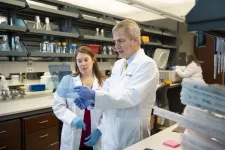Breakthrough in the precision engineering of four-stranded β-sheets
Metal coordination-based approach paves the way to the controlled synthesis of important protein structural motifs
2024-12-10
(Press-News.org)
A newly developed approach can precisely produce four-stranded β-sheets through metal–peptide coordination, report researchers from Institute of Science Tokyo. Their innovative methodology overcomes long-standing challenges in controlled β-sheet formation, including fibril aggregation and uncontrolled isomeric variation in the final product. This breakthrough could advance the study and application of β-sheets in biotechnology and nanotechnology.
In addition to the natural sequence of amino acids that makes up a protein, their three-dimensional arrangement in space is also critical to their function. For example, β-sheets, which are sheet-like structures formed via hydrogen bonds between adjacent peptide strands, play a crucial role in protein stability and folding. They are also implicated in various neurodegenerative diseases, including Alzheimer’s disease. On the flip side, the engineering of β-sheets has potential applications in biotechnology, medicine, and nanomaterials science.
Unfortunately, producing β-sheet assemblies with a precisely controlled number of strands is quite challenging for two reasons. First, multi-stranded β-sheets tend to clump up into aggregates called fibrils, which can easily become insoluble and alter or negate their biological function. Second, when peptide strands are combined during β-sheet synthesis, many structural isomers are possible. This means that the resulting assemblies often have unpredictable strand orientations, alignments, or numbers, making it difficult to produce only a specific target compound. Because of these reasons, a new method for creating custom β-sheets is needed.
In a recent study published in Angewandte Chemie International Edition on 22 October 2024, a team of researchers led by Associate Professor Tomohisa Sawada from Institute of Science Tokyo (Science Tokyo), Japan, set out to find a solution to these issues. As reported in their study, they developed a promising approach to produce four-stranded β-sheets using silver atoms as metal–peptide coordination centers.
The researchers engineered a pentapeptide, referred to simply as ‘1,’ in which the second and fourth residues were 3-pyridyl-substituted alanine residues. The pyridyl groups, which were introduced on opposite sides of the main chain, served as metal complexation sites for the silver atoms. Upon addition of silver (Ag), two ‘1’ molecules would combine to form an Ag2(1)2 ring as a hypothetical intermediate. Interestingly, because of the reversibility of metal coordination during the reaction, pairs of Ag2(1)2 rings end up in an interlocked state, with hydrogen bonds between adjacent pentapeptides holding the overall β-sheet structure together.
The team confirmed the successful synthesis of these interlocked structures, [Ag2(1)2]2, via nuclear magnetic resonance and X-ray crystallographic measurements. Most remarkably, the four-stranded β-sheets produced converged to a single type of isomeric structure without aggregation. Simply put, all β-strands were made of two interlocked rings, with the first and third strands pointing in one direction and the second and fourth strands pointing in the other. The relative positions of the interlocking metal-complexation sites were also equal across all produced β-strands. “Our results demonstrated that the combination of β-sheet amide hydrogen bond formation and metal cross-linking of side chains limits the number of possible isomers. In other words, we showed that non-covalent side chain cross-linking can induce highly selective single structure β-sheets in a discrete form,” remarks Sawada.
The findings presented in this study could make the study of β-sheets easier, thereby unlocking their potential in next-generation biotechnology and nanotechnology. “To the best of our knowledge, this is the first example of the precise construction of a four-stranded β-sheet assembled from non-covalent interactions only. We believe that our efforts pave the way for the rational construction of β-sheet structures and functions in the future,” concludes Sawada, excited about the possibilities.
Only time will tell what other ingenious strategies we can come up with for engineering peptide nanostructures to suit our needs.
About Institute of Science Tokyo (Science Tokyo)
Institute of Science Tokyo (Science Tokyo) was established on October 1, 2024, following the merger between Tokyo Medical and Dental University (TMDU) and Tokyo Institute of Technology (Tokyo Tech), with the mission of “Advancing science and human wellbeing to create value for and with society.”
END
[Attachments] See images for this press release:

ELSE PRESS RELEASES FROM THIS DATE:
2024-12-10
A new paper in the Journal of Public Health, published by Oxford University Press, finds that household income in early childhood is a stronger and more consistent predictor for several major health-related problems for 17-year-olds than growing up in a poor neighborhood. The neighborhood was a slightly stronger predictor for obesity only.
The Index of Multiple Deprivation, which assesses neighborhoods in the United Kingdom according to factors including unemployment, low levels of education, crime, and barriers ...
2024-12-10
LEIDEN, Netherlands, 10 December 2024 – In a wide-ranging Genomic Press Interview, eminent neuroscientist Dr. Edo Ronald (Ron) de Kloet reveals crucial insights into how stress hormones can shift from protecting to potentially damaging the brain, a discovery that has transformed our understanding of stress-related mental disorders and opened new therapeutic pathways.
Dr. de Kloet, Professor Emeritus at Leiden University Medical Centre and an Academy Professor of the Royal Netherlands Academy ...
2024-12-10
Quitline coaching over the phone helped almost half of young people who vape ditch the habit, potentially improving their health and decreasing the chances they’ll transition to cigarettes, according to a new study.
The finding is promising and provides critical evidence about vaping cessation, an area with limited research to date, said Liz Klein, a researcher at The Ohio State University College of Public Health and co-author of the study, which appears in the American Journal of Preventive Medicine today (Dec. 10, 2024).
“This study provides hope that young adult ...
2024-12-10
A majority of U.S. adults hope to avoid political discussions during the holidays and, in some cases, family members they disagree with, according to a survey by the American Psychological Association.
More than 7 in 10 adults (72%) said they hope to avoid discussing politics with family over the holidays. And while 65% of adults said they were not worried that political discussions would hurt their relationships with their family members during the holidays, nearly 2 in 5 adults (39%) said they were stressed ...
2024-12-10
Despite a modest 5% improvement since 2023, food insecurity in L.A. County remains alarmingly high — well above the national average and L.A.’s pre-pandemic level. A USC Dornsife College of Letters, Arts and Sciences study found that as of October 2024, 25% of L.A. County households — about 832,000 — struggle with food insecurity. By comparison, the national average is just 14%. Among low-income households in L.A. County, 41% experienced food insecurity in 2024, compared to 27% pre-pandemic.
“The ...
2024-12-10
A positive attitude, what researchers call a "growth mindset" or belief in growth, is associated with both higher willpower and passion, according to a new large study.
People who believe they will succeed are far more passionate and have greater willpower than those who do not have the belief, says Hermundur Sigmundsson, a professor at the Department of Psychology at NTNU.
Sigmundsson has worked for many years to find out what makes people succeed in their goals. Now he and Professor Monika Haga at NTNU'S Department of Teacher ...
2024-12-10
University of Cincinnati Cancer Center experts will present abstracts at the 66th American Society of Hematology (ASH) Annual Meeting and Exposition Dec. 7-10 in San Diego.
Trial finds AML drug is safe in healthy volunteers
A randomized Phase 1 trial in healthy volunteers found a new drug targeting treatment-resistant acute myeloid leukemia (AML) is safe and attains drug levels that would predict response in this disease.
Up to 30% of patients with AML have a specific mutation called FLT-3, and a standard FLT-3 treatment called gilteritinib was approved by the Food and Drug Administration in 2018. But as the cancer has evolved, patients ...
2024-12-10
MIAMI, FLORIDA (EMBARGOED UNTIL DEC. 9, 2024, AT 9 PM EST) – Patients with multiple myeloma are living longer, healthier lives thanks to a host of new immunotherapies and targeted drugs. But there is still no cure for the disease, the second most common blood cancer. Physician-scientists at Sylvester Comprehensive Cancer Center, part of the University of Miami Miller School of Medicine, are working to change that.
They will present research findings at the 2024 annual meeting of the American Society of Hematology (ASH), which will be held Dec. 7-10 in San Diego.
“We’d like to develop a curative ...
2024-12-10
MIAMI, FLORIDA (STRICTLY EMBARGOED UNTIL DEC. 9, 2024, AT 9 PM EST) – Smokers with myelodysplastic syndromes (MDS) or a precursor condition had elevated levels of genetic mutations linked to the disease, a new study shows. The study also found that heavier smokers accumulated more mutations, and long-term smokers were more likely to show disease progression.
Led by Sangeetha Venugopal, M.D., M.S., a physician-scientist at Sylvester Comprehensive Cancer Center, part of the University of Miami Miller School of Medicine, the study further suggests that quitting smoking ...
2024-12-10
Helical structures are ubiquitous across biology, from the double-stranded helix of DNA to how heart muscle cells spiral in a band. Inspired by this twisty ladder, researchers from Hiroshima University’s Graduate School of Advanced Science and Engineering have developed an artificial polymer that organizes itself into a controlled helix.
They published their results on Oct. 24 in Angewandte Chemie.
“Motivated by elegant biological helical structures, considerable effort has been devoted to developing artificial helical organizations with defined handedness ...
LAST 30 PRESS RELEASES:
[Press-News.org] Breakthrough in the precision engineering of four-stranded β-sheets
Metal coordination-based approach paves the way to the controlled synthesis of important protein structural motifs





